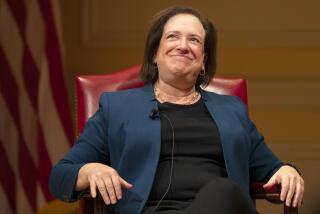Breaking the Barriers
The U.S. Supreme Courtâs decision Monday upholding the application of Californiaâs Unruh law to the Rotary clubs is an important statement of the proper balance between the individualâs right of free association and societyâs goal of ending discrimination against women. While the opinion of Justice Lewis F. Powell Jr. was narrowly drawn to apply to the specific facts in this case, the principles that he enunciated for a 7-0 majority could have much wider application.
Powell noted that the Rotary clubs have many members and a high turnover rate, and that they engage in public activities, welcome the participation of non-members and seek coverage by the press. As a result, he said, âThe relationship among Rotary Club members is not the kind of intimate or private relation that warrants constitutional protection.â So a state may legally pass a law barring discrimination against women, and the Rotary International may not throw out a local chapter, like the one in Duarte, that admits women.
Moreover, the test that Powell enunciated could properly be applied to other so-called private clubs that are more like public accommodations than they are like private living rooms--an area in which the state may not legislate.
The tide of social change in this arena is clear, and the courtâs unanimous opinion gives it resounding support. The days of discrimination against women and minorities are numbered, and all those who still engage in this practice should step aside before they are brushed aside.
More to Read
Sign up for Essential California
The most important California stories and recommendations in your inbox every morning.
You may occasionally receive promotional content from the Los Angeles Times.










